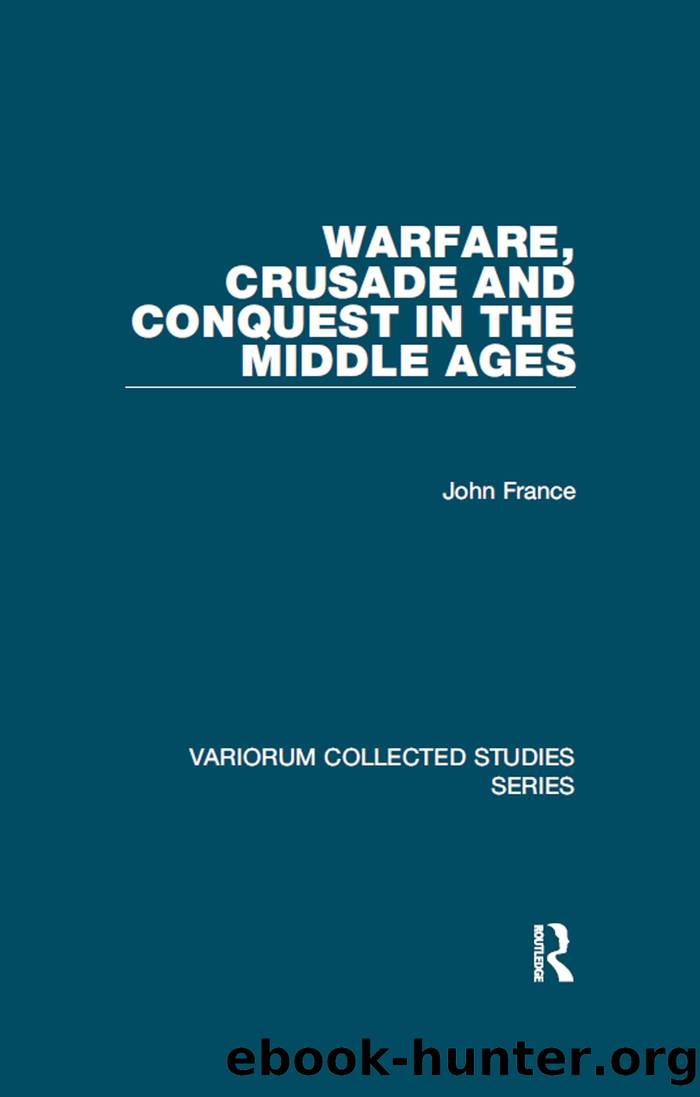Warfare, Crusade and Conquest in the Middle Ages by John France

Author:John France
Language: eng
Format: mobi, azw3, epub
Tags: Non-Fiction, Warfare, Christianity, Religion, Medieval History, Middle East, Islam, War, History
ISBN: 9781472428202
Publisher: Taylor & Francis (Unlimited)
Published: 2023-04-21T00:00:00+00:00
XI
THE CRISIS OF THE FIRST CRUSADE: FROM THE DEFEAT OF KERBOGAH TO THE DEPARTURE FROM ARQA
In the summer of 1098, immediately after the defeat of Kerbogah, the army of the First Crusade halted in its progress towards Jerusalem. The ostensible reason for this halt was that the summer weather did not favour campaigning, and it was agreed that the army should wait until the beginning of November before resuming its march (1). In fact it was not until January 13th that a part of the army apparently began its march south (2), and the rest did not follow suit until much later, in late February (3). The intervening time was spent in rest, and, from the autumm of 1098, in bitter quarrels which centred on possession of the city of Antioch. Historians have tended to regard the squabble over Antioch as an incident which did no more than delay the Holy Expedition. It is the case of the present writer that the question of Antioch was only a symptom of a deeper crisis which almost disrupted the crusade totally. This crisis, it will be suggested, was provoked by the underlying weaknesses of the crusader army; the divergent ambitions of its leaders, and the lack of a definite structure of command. These disrupting factors were countered by strong forces which favoured the continuance of the crusade; the desire common to all to succeed in the enterprise once started, reinforced by the obligation to fulfill the solemn crusading oaths, all stimulated by the demands of the clergy and the needs of the poor whose role in the crusade has been greviously underestimated and misunderstood by historians.
The factual basis of this study is of course well known, and all that is attempted here is a fresh interpretation of the material provided by our sources, leaning heavily and inevitably upon the ideas of others. But it is to the sources that we must address ourselves, if we wish to understand the history of the crusade, and a few preliminary comments on the main sources must be ventured, although it is impossible here to embark on a Quellenstudie. Historians have viewed with general approval the account of the crusade given in the anonymous Gesta Francorum (1). It would seem proper, however, to emphasize the major limitations of the Gesta as a source for the period under study. The Anonymous was a South Italian Norman attached initially to the army of Bohemond of Otranto, who later, perhaps in the autumn of 1098, attached himself to the army of the count of Toulouse (2). Generally speaking he is very much interested in the doings of Normans and stresses their role. More limiting is the fact that he was not high in the councils of the leaders, and he more often gives expression to the vague ideas of his class about high policy, than helpful statements about that policy (3). Further, as a knight the Anonymous does not seem to have been greatly interested in the lot of the poor; he tells us remarkably little of their doings.
Download
Warfare, Crusade and Conquest in the Middle Ages by John France.azw3
Warfare, Crusade and Conquest in the Middle Ages by John France.epub
This site does not store any files on its server. We only index and link to content provided by other sites. Please contact the content providers to delete copyright contents if any and email us, we'll remove relevant links or contents immediately.
| Belgium | France |
| Germany | Great Britain |
| Greenland | Italy |
| Netherlands | Romania |
| Scandinavia |
Room 212 by Kate Stewart(4108)
The Crown by Robert Lacey(4108)
Endurance: Shackleton's Incredible Voyage by Alfred Lansing(3845)
The Iron Duke by The Iron Duke(3641)
The Rape of Nanking by Iris Chang(3518)
Killing England by Bill O'Reilly(3458)
Joan of Arc by Mary Gordon(3260)
Say Nothing by Patrick Radden Keefe(3062)
I'll Give You the Sun by Jandy Nelson(2842)
Hitler's Monsters by Eric Kurlander(2734)
Shadow of Night by Deborah Harkness(2720)
Margaret Thatcher: The Autobiography by Thatcher Margaret(2687)
Mary, Queen of Scots, and the Murder of Lord Darnley by Alison Weir(2678)
Darkest Hour by Anthony McCarten(2648)
Blood and Sand by Alex Von Tunzelmann(2610)
Red Famine: Stalin's War on Ukraine by Anne Applebaum(2466)
Eleanor & Park by Rainbow Rowell(2394)
The One Memory of Flora Banks by Emily Barr(2349)
Book of Life by Deborah Harkness(2265)
